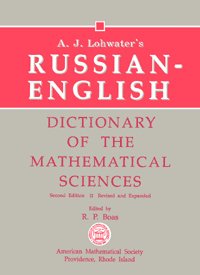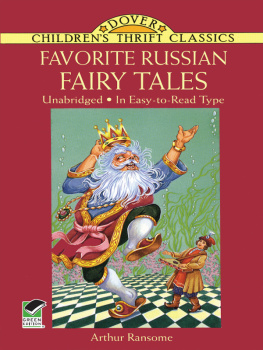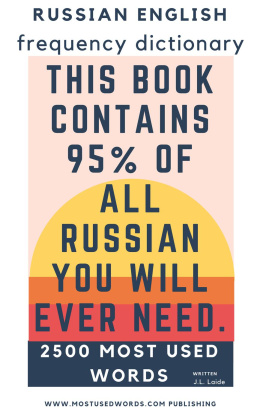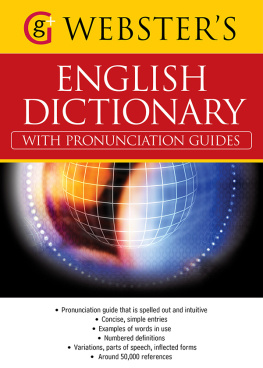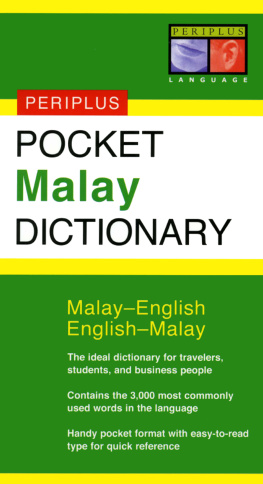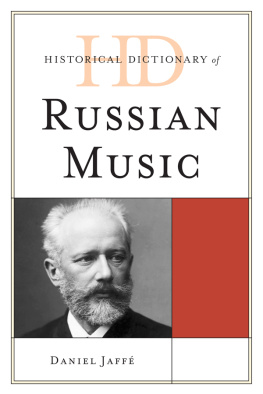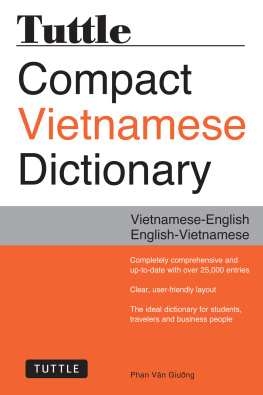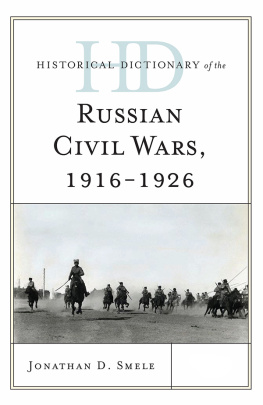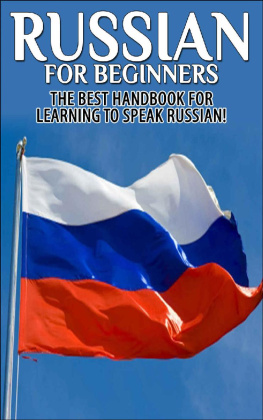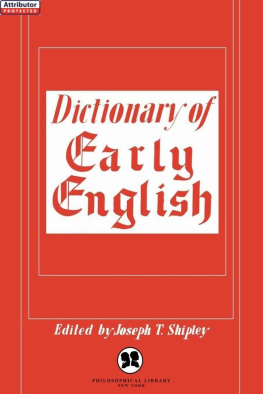 | |
| A. J. Lohwater's RussianEnglish Dictionary of the Mathematical Sciences. Second Edition, Revised and Expanded. Edited by R. P. Boas. American Mathematical Society. Providence, Rhode Island. [ R. P. Boas , , , , , , , . , , , ( , , ). E.G.A.] |
| |
| |
, , spell checker' , . :
(perf. of ), v., succeed
, , ( double click' Internet Explorer, ) .
| Contents |
|
|
|
|
|
|
| 2 |
| 5 |
| 12 |
| 15 |
| 18 |
| 30 |
| 33 |
| 34 |
| 37 |
| 45 |
| 50 |
|
|
| 53 |
| 56 |
| 58 |
| 61 |
| 70 |
| 71 |
|
|
This dictionary is intended for use primarily by speakers of English who need to understand Russian mathematical writing and/or to translate such writing. As far as possible, the "definitions" are translations rather than explanations, and reflect current usage in mathematical writing. The vocabulary has been extensively enlarged and brought up to date, although it retains some obsolete terms that may be needed by users who have to consult older literature. Users may encounter material that has not been composed in the most approved or correct style. Therefore, some words that are frowned on by Soviet purists have been retained, or added, because they occur in writing by Soviet authors whose native language is not Russian, and whose knowledge of Russian is less than perfect.
The dictionary must not be inverted: that is, read backwards as an English-Russian dictionary. We have attempted to give idiomatic translations, but a Russian word is not necessarily a correct or exact equivalent of the English word that is used to translate it in a particular context. Just because can be correctly translated as "boundary value problem" does not mean that either, or any part, of the Russian words means "value."
Many users of the dictionary have asked for the addition of stress markings on Russian words, and these have now been supplied. [ , , . "" "" , . :) E.G.A.] We have added many new entries and amplified old entries; and we have eliminated as many as possible of the mistakes of the first edition. However, some inconsistencies remain. A few spurious words have been added as a trap for plagiarists.
The grammar section has been rewritten by Alana I. Thorpe of the Brown University Slavic Department. We have added some notes on Russian mathematical notation. An appendix contains complete paradigms of a large number of selected words, to facilitate the identification of irregular inflected forms. The grammar is intended only for reference. Users who need instruction in Russian grammar should consult publications that are devoted to that topic. S. H. Gould's A Manual for Translators of Mathematical Russian, published by the American Mathematical Society, contains many useful suggestions that are beyond the scope of the Dictionary.
We have assumed that users will know enough Russian to be able to recognize inflected forms of words. We have followed the common practice of listing nouns in the nominative singular, adjectives in the masculine nominative singular, and verbs in the imperfective infinitive, with the perfective (if there is one) in parentheses.
Theoretically, the Russian spelling of foreign names is supposed to represent the pronunciation used in the original language. Thus, = Euler, = Nagy, = Gteaux. Nevertheless, it is often difficult to determine the correct spelling of the original name, especially when it is French or Hungarian. We have included a selection of Russian versions of mathematicians' names.
Adjectives formed from proper names are not capitalized in Russian. If a word seems strange, it very well may be such an adjective.
Some entries may seem unnecessary, because they mean just what they look like. There are, however, enough Russian words that resemble English words, but mean something entirely different, that we preferred to include too many rather than too few.
We thank the hundreds of mathematicians, from many countries, who have made the revision of the Dictionary possible by contributing suggestions for corrections and additions.
The Society intends to update the Dictionary from time to time. Consequently, users are encouraged to submit additions and corrections to Russian-English Dictionary, c/o American Mathematical Society, P.O.Box 6248, Providence, RI 02940-6248.
R. P. Boas Northwestern University
| Abbreviations Used in the Dictionary |
abbrev. abbreviation
acc. accusative case
adj. adjective
adv. adverb
cf. compare
colloq. colloquial
compar. comparative
conj. conjunction
dat. dative case
f. feminine
gen. genitive case
imperf. imperfective
instr. instrumental case
loc. locative case
m. masculine
n. neuter
nom. nominative case
num. numeral
ord. num. ordinal numeral
part. participle
perf. perfective
pl. plural
p.n. proper name, personal name
pred. predicate
prep. preposition
pron. pronoun
sing. singular
v. verb
A Short Grammar of the Russian Language
| Introduction and Alphabet |
Like any inflected Indo-European language, the Russian language is studied by means of an analysis of the declension of nouns and adjectives and the conjugation of verbs, together with their use in conjunction with prepositions, connectives, etc. The first obstacle which the beginner encounters, however, is the problem of the alphabet. Once the alphabet has been learned, the study of Russian becomes relatively simple, certainly no more difficult than the study of German. The Russian, or Cyrillic, alphabet is an interesting combination of Roman, Greek, and Hebrew characters; following the Bolshevik Revolution, the orthography was revised and modernized, and, in the alphabet given in the following table, the older characters are listed for the convenience of those readers who must make occasional references to the pre-Revolution literature. Since the italicized alphabet is used in places of such critical interest as the statements of theorems, etc., many phrases and sentences are duplicated in italics in the grammatical sketch so that the reader will become accustomed to reading italicized printing.
No universal agreement has been reached on the transliteration of the Russian alphabet, and the most commonly used systems of transliteration are given in the following table. System I is that used by the Library of Congress and is the most commonly used system for nontechnical literature in the United States. System II is the system used in Mathematical Reviews from 1980 onward. System III was used in Mathematical Reviews
Next page
